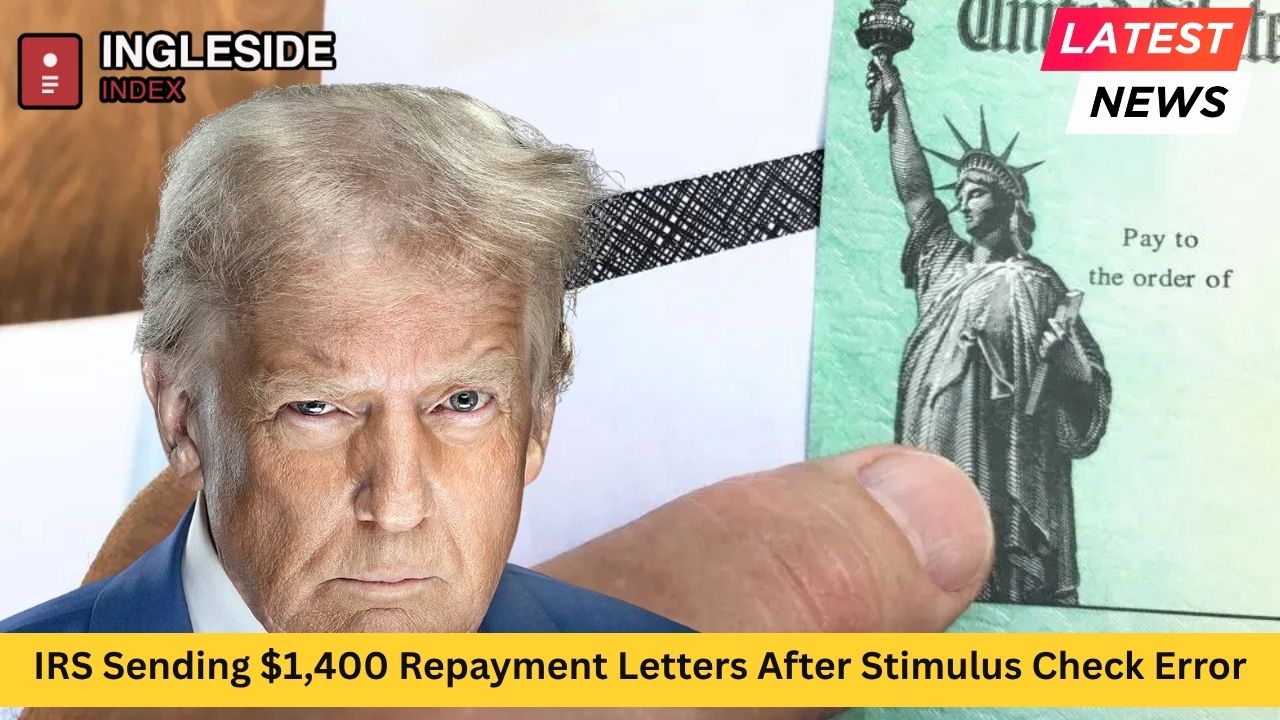Across the United States, from New York City to Los Angeles, thousands of taxpayers have been surprised to receive repayment letters from the Internal Revenue Service (IRS), instructing them to return $1,400 previously issued as a stimulus payment. This unexpected turn of events follows an administrative error, with stimulus payments mistakenly issued to individuals who weren’t eligible for the 2021 Recovery Rebate Credit under the American Rescue Plan.
Background: The Third Stimulus Check and Recovery Rebate Credit
In 2021, as part of the American Rescue Plan, the US government distributed a third round of Economic Impact Payments to support Americans during the economic upheaval caused by the pandemic. The value of each check was $1,400 for eligible recipients. Most received their payments promptly, but administrative complexity and filing confusion meant that, by late 2024, not all eligible residents had received the funds.
To remedy this, the IRS began reviewing old tax claims and late filings, seeking to ensure that those who qualified but hadn’t received their checks would not miss out. This process led to over a million taxpayers—especially in cities with high concentrations of students and immigrants, such as Boston, Chicago, San Francisco, and Houston—receiving payments or notices about their eligibility well into 2025.
The Error: Stimulus Payments Sent to Ineligible Recipients
However, in the haste to ensure eligible people received the third stimulus check, some ineligible individuals also received payments in error. The IRS mistakenly approved payments for thousands who had previously filed their taxes as nonresident aliens, students on temporary visas, or others not meeting eligibility requirements for the original 2021 credit.
For instance, large numbers of recipients in university cities like Cambridge, Massachusetts (home to MIT and Harvard), and cities with many international student residents—including Austin, Seattle, and Ann Arbor—received checks unexpectedly. The confusion was compounded by outdated information or misfiled returns, particularly where Form 1040-NR was used, a tax form for nonresident aliens.
The IRS Response: Repayment Requests
Starting in July 2025, impacted taxpayers throughout cities such as Miami, Philadelphia, Atlanta, and not just smaller towns, began reporting receipt of formal IRS notices requesting repayment of the $1,400. Letters referenced the payments made in January 2025, and asked for the funds to be returned as they were made in error.
The structure of these letters sparked anxiety and suspicion. Many noticed the lack of a clearly recognizable return address, while some ZIP codes used did not correspond to legitimate IRS locations. Recipients from Detroit, Dallas, and San Diego shared their confusion online, wondering if the letters might be a scam because payment instructions were unclear or the letter lacked clear payment options.
Communities React: Stories From Across the Nation
Taxpayers in San Jose, Denver, and Phoenix became vocal on forums and social media. For example, some had never expected the $1,400 and had believed their tax submissions from 2021 were long settled. Others—especially those who had moved, changed legal names, or switched bank accounts—struggled further. Depositing a physical check proved difficult for those with outdated personal information on file.
In Minneapolis and Charlotte, some recipients reported difficulty getting clarification; calls to the IRS met with long wait times or instructions that contradicted the letter contents.
The Scope: How Many Were Impacted?
Estimates suggest hundreds of thousands of Americans in major metropolitan areas were affected. While the IRS had been working to ensure that around one million taxpayers received long-overdue Recovery Rebate Credit payments, a significant subset—possibly tens of thousands—were sent checks in error. The ripple effects of these mistakes were felt in nearly every state, but particularly in places with high numbers of international tax filers.
How Does the Error Occur?
The complexity of US tax law—and specifically, eligibility for pandemic-era stimulus checks—created perfect conditions for such mistakes. For the third Economic Impact Payment, eligibility hinged on residency status, income level, and prior claiming of other relief programs.
Nonresident aliens, many of whom study or work temporarily in the US, were ineligible. Yet, if a nonresident filed taxes using the wrong form, or later became a resident but the IRS still used prior data, the possibility existed to mistakenly issue a payment. Additionally, confusion about whether to file as a resident or nonresident abounded among international students, further muddling IRS data.
Instructions For Returning Erroneous Payments
If you received a $1,400 check or direct deposit in error, the IRS expects you to return the funds. The official process for returning an uncashed check is to void it and submit it to the IRS, ideally in person at a Taxpayer Assistance Center. Cashed checks or direct deposits should be repaid with a personal check or money order labeled for the Treasury and include a clear explanation for the return.
However, recipients in Baltimore, Portland, New Orleans, and other cities struggled to follow these guidelines. Some found the process unclear, with letters missing clear instructions or return information. The IRS’s advice is to contact your nearest Taxpayer Assistance Center or consult with a tax professional to navigate the repayment process.
Fraud and Scams: Distinguishing Real From Fake
Complicating matters are scams that parallel the genuine IRS repayment letters. Scam artists, seeking to profit off confusion, have sent out phishing texts and emails claiming to be from the IRS, offering fake links for payment or asking for sensitive information. The IRS has reiterated it never contacts taxpayers by text or email and will only send official correspondence via postal mail.
A Real-Life Scenario: An International Student in New York
Consider Tomoko, a Japanese graduate student living in New York City. She filed her taxes in 2021 using Form 1040-NR, correctly identifying as a nonresident. Yet, in early 2025, she received a $1,400 check. Months later, an IRS letter arrived requesting its return. Tomoko, like hundreds of other students in college-heavy cities, faced confusion over whether to return it, how to do so, and concern as she read stories about scams. Ultimately, Tomoko confirmed the letter’s authenticity with her school’s international office and returned the funds as instructed.
What If You Already Spent the Money?
Many recipients of the error payment, particularly in high-cost cities like San Francisco, Chicago, and Seattle, had already spent the funds by the time they were contacted. The IRS’s expectation is full repayment, but recipients experiencing financial hardship should communicate promptly with the agency to discuss options. Failing to return payment could trigger penalties, further IRS action, or affect future tax refunds.
Broader Impacts and Lessons Learned
The mistake underscores both the logistical challenges the IRS faces in updating, reviewing, and harmonizing its massive database and the maze that is the American tax system. This event has spotlighted the persistent confusion faced by international students, new immigrants, and anyone straddling the line between residency statuses for tax purposes.
Moreover, for cities like Houston, Washington DC, and Las Vegas, the error has shone a spotlight on the need for clearer, more accessible tax guidance, particularly for populations with less familiarity with US tax law.
Protecting Yourself: Tips for Taxpayers
-
If you receive a letter requesting repayment, verify its authenticity through the IRS’s website or by contacting a local Taxpayer Assistance Center.
-
Never click on suspicious links or provide personal information via text, email, or unverified phone call.
-
If you cashed the erroneous payment, reach out proactively to the IRS to make arrangements and avoid penalties.
-
Keep records of all correspondence and payments made for documentation.
Looking Ahead: Policy and Administrative Reforms
The IRS, aware of the public relations and trust setback, has indicated it will review and refine its processes for issuing payments and communicating with taxpayers. Calls for modernized computer systems, streamlined communications, and increased support for nonresident filers continue to mount.
In the meantime, individuals in every major city—ranging from Tampa and Sacramento to Salt Lake City and Oklahoma City—should stay alert for official IRS communications, double check their eligibility for any tax credit or stimulus payment, and seek out professional help when in doubt.
Conclusion
The saga of the $1,400 repayment letters is a cautionary tale about the scale and complexity involved in national economic relief initiatives. It underscores the importance of accurate tax filing, ongoing awareness of one’s rights and responsibilities, and the need for robust, intuitive communication between federal agencies and taxpayers nationwide. As residents of every corner of the US navigate these letters, they serve as a reminder that in the modern era of tax policy, vigilance and verification are more essential than ever before.




